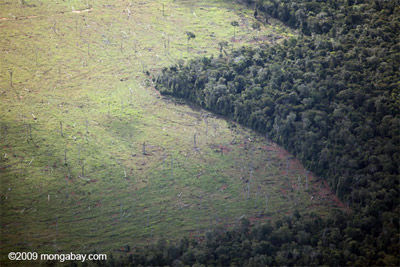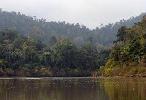Activist group have condemned the latest draft text of an agreement that aims to protect rainforests as a means to mitigate climate change.
The Reducing Emissions from Deforestation and Degradation (REDD) text has been stripped of its chief goal to reduce forest clearing by at least 50 percent by 2020, while key safeguards to protect indigenous people and biodiversity and limit forest conversion to plantations have been moved from the operative section of the agreement to a non-binding preamble. The language obliging consuming countries to take steps to address their role in driving deforestation have also been relegated to the preamble.
“It’s hardly surprising that developing countries won’t commit to global targets for deforestation when rich countries haven’t yet provided the necessary financing for REDD or global targets for deep reductions of industrial emissions,” Nathaniel Dyer of Rainforest Foundation UK, a member of the Ecosystems Climate Alliance (ECA) which is comprised of several activist organizations, said in a statement.
 Deforestation in the Brazilian Amazon. Photo by Rhett Butler |
“Limiting safeguards to the preamble weakens the agreement and deprives it of any assurance of compliance,” added Rosalind Reeve of Global Witness in a statement released by ECA.
But activist did see some progress in some parts of the text.
Wettlands International, a group that campaigns on behalf of wetlands and is a member of ECA, noted that the next language allow addressing emissions from the loss of wetlands, a source of at least 500 million tons of CO2 per year.
“In the latest draft-text on a new Kyoto Protocol, the Parties have now defined a new accounting activity: ‘wetland management,'” said the NGO in a statement. “This is a great step forward.”
“Today’s new draft texts on REDD are promising for addressing emissions from peat soils. The activities that are eligible for funding under REDD include actions to reduce forest degradation and enhancement of forest carbon stocks. This may allow support for measures to reduce further degradation of peatsoils.”

The text also makes explicit reference to protection of natural forests for the first time and re-includes a safeguard on conversion of natural forests to plantations, although both are still not required actions. The text will be negotiated further during the final week of Copenhagen talks.
“Clearly, everyone agrees that the world’s tropical forests need to be protected,” said Bill Barclay of Rainforest Action Network. “But good intentions aren’t enough, they have to be paired with action. Ministers must act to strengthen the REDD text next week if we have any hope of a REDD that will be effective in protecting tropical forests.”
“The outcome of the negotiations of REDD under the UNFCCC will be crucial for the future of tropical rainforests and forest-dependent peoples,” said Jerôme Sitamon of Maison de l´Enfant et de la Femme Pygmées (MEFP), Central African Republic, in a statement released by the Accra Caucus, a coalition of over 100 non-governmental organizations from 30 countries. “If we lose the battle against deforestation we lose the battle against climate change.”
Related articles
REDD may miss up to 80 percent of land use change emissions

(12/11/2009) The political definition of ‘forest’ used in REDD (Reduce Emissions from Deforestation and forest Degradation) threatens to undermine the program’s objective to conserve ecosystems for their ability to sequester carbon, according to a new analysis by the Alternatives to Slash and Burn (ASB) Partnership for Tropical Forest Margins. In an analysis of three Indonesian provinces using REDD proposals for carbon accounting, ASB found that REDD may miss up to 80 percent of the actual emissions due to land use change. The carbon accounting problems could be fixed, according to ASB, by expanding REDD’s purpose from reducing emissions linked to deforestation (considering the problematic definition of forests) to reducing emission from all land use changes that either release or capture greenhouse gases, including but not limited to forests.
Destruction of old-growth forests looms over climate talks

(12/08/2009) Destruction of old-growth or primary forests looms large in discussions in Copenhagen over a scheme to compensate tropical countries for reducing emissions from deforestation and degradation (REDD). Some environmental groups are pressing for conservation of old-growth forests — the most carbon-dense, and biologically-rich state of forests — to be the centerpiece of REDD, while industry and other actors are pushing for “sustainable forest management” or logging using reduced-impact techniques to be the primary focus of REDD.
In absence of measures to address consumption, REDD may fail to protect forests

(12/02/2009) Rising demand for timber and agricultural products could work against a proposed initiative to reduce emissions from deforestation and degradation (REDD), warns a new report from the Environmental Investigation Agency (EIA). The briefing, Putting the Brakes on Drivers of Forest Destruction: A Shared Responsibility, says that investment in REDD will not be enough to protect forests if the underlying drivers of deforestation — namely consumption — are not addressed. It urges negotiators to re-insert critical text that has been dropped from the working text on REDD ahead of next week’s climate change conferences in Copenhagen.







